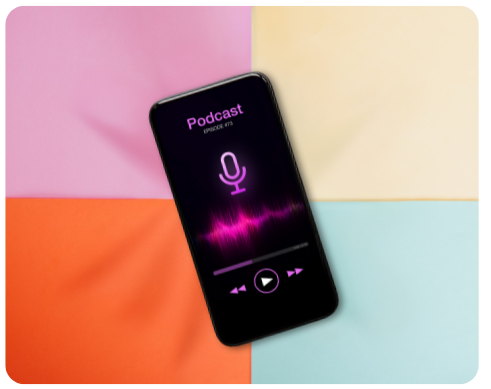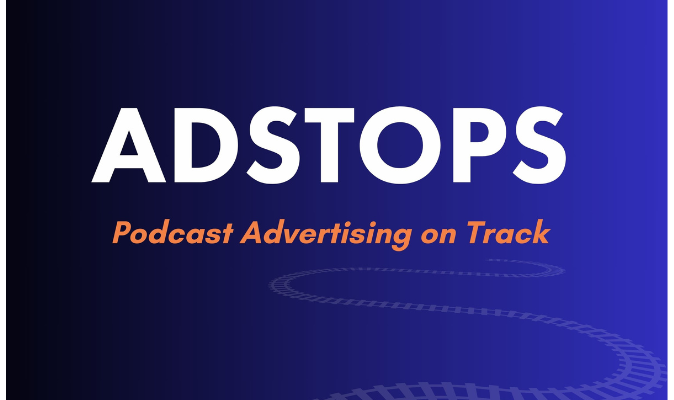
Advertising Strategies: The Power of Independent Podcasters
Podcast sponsorship experts ADOPTER Media’s Glenn Rubenstein and Athletic Greens’ Martha Gallant discuss the benefits of sponsoring independent podcasts.Check out their chat below!
(Live from the X Fronts)
GR: I’m Glenn Rubenstein from the podcast advertising agency ADOPTER Media. I am here today to talk with Martha Gallant, the Senior Director of Audio Partnerships at Athletic Greens. How are things going at Athletic Greens with audio partnerships?
MG: Always a good time. We’re busy. We’ve got a lot of fun stuff going on.
GR: To start with, we’re going to dive in and talk about the different challenges brands face the different approaches to podcast advertising, but really focus on independent podcasts since they are so front and center at the X Fronts.
What do you love about working with independent podcasters?
MG: Independent podcasters are – in a lot of ways – our bread and butter, and we love kind of having access to the actual hosts and working really closely with them. Everything we do is based on a true partnership, product placement, and people who want to see our business succeed as much as we want to see their succeed.
So it’s been huge for us. We also love we love working with networks we enjoy. All kinds of different partnerships, but we love the smaller people, because it’s a lot more collaborative. We can get creative about the partnerships.
But it has to be a a deeper partnership and a little bit less transactional to really grow together.
GR: Absolutely. And I think that’s the thing that’s really important for advertisers to keep in mind. You’re here because you’ve heard such great things about podcast advertising.
But you really have to look at the context of what you’ve heard about. And when you look at the huge success stories in this business, whether it’s going back to Squarespace, Blue Apron, Helix Sleep — all the brands that are so synonymous with podcast advertising — you really have to look at the types of ads that got them to where they are and got them the results that they were looking for.
And at the same time, the medium has evolved so much. Over recent years, then now there are so many different ways to place ads. New advertisers know that podcast advertising works. They’ve heard the stories, they want to try it, but they almost don’t understand the process to get the effective result they’re looking for.
MG: Things have changed a lot.
The podcast business has changed a lot and the demand is really high for inventory here. So you need to be a little bit more creative than those quick wins that people had five years ago.
GR: I think that’s really the key. Our podcast advertising agency, we work with over a dozen brands. We’re placing about 20 million dollars in podcast ads this year. And what’s amazing is every advertiser starts with a phone call to our agency, talking about what they want to do in this space. And a lot of times they’re already frustrated all these different ways of buying ads (which is why they call us).
The landscape has evolved beyond what they were expecting. They know that traditionally a host reads an ad, gives an endorsement of the product, tells a great compelling story, and somewhere along the way that translates into sales. Hopefully we can demystify some of this process today in how independent podcasts preserve that process.
We love all of our independent and network partners. We work with a lot of them, but when brands really want that hands-on experience, you want that endorsement. You want that true partnership and a deeper integration than dealing simply trying to scale across 500 or a thousand different podcasts.
Now, a series of transactions can be part of your audio strategy as well. But for that old school approach, it’s very much alive and kicking with independent podcasters.
How do you look at core demographics and targets and subject matter when you’re evaluating your media mix?
MG: No media partnership is off the table, but there are different levers that can guarantee success. We think that a key thing is thought leadership. So how much is this host respected with the knowledge and guidance that they bring to their audience.
And this could vary a lot. It could be someone who, you know, who guides you in your, I don’t know, your keto journey and is the absolute go to thought leader in that space? Or it could be someone who just narrates a true crime story. Those are going to have really different kind of pull powers to get people to think about your product, go to your web because a one person guides your day to day and one person entertains you.
GR: There’s something interesting there.
If you have subject matter alignment, I think that’s a mistake podcast sponsors can make. They think “we have a keto friendly product, we should be advertising on keto podcasts.” or “we have a parenting product. we should be advertising on parenting podcasts.”
A lot of the. Those CPMs are going to be at a huge premium. And then additionally, you’re at a disadvantage because that audience is already “the converted.” They already know about the features, the benefits, and unless you’re completely reinventing the wheel, they’re already taking steps to be at a more advanced level.
Have you found that, whether you’re selling sleep or whether you’re selling nutritional supplements? I know in my experience, it’s a lot easier to sell to the health-curious rather than the diehard health and fitness fanatic.
MG: There’s a couple of points there. First of all. Yes. We definitely always want to be hitting the health-curious people who are adjacent to your product who aren’t already there, because at this point we’re on so many podcasts that if you’re a triathlete and you listen to triathlon podcasts, you’ve heard about us.
So we want to get those kinds of adjacent folks, and you need to look for some decent demographics. If you’re a more premium product, try and look for household and geography, if you need that. Luckily we’re a global company, so we can be looking at all these different countries, but if you’re not then you do want to consider that some of the audiences isn’t where you can sell.
But I think that subject matter is such an interesting thing because. We’re all complex humans. And I think a really good example is parents. Parents are complex humans. They’re not just parents. They’re also just people. Parents are listening to true crime and parents are listening to Dax Shepard — they’re not all just learning about parenting all the time.
They’re more than just a parent. So you know, you want to treat people like human beings complex. It’s also noisy. If you’re going to listen to a parenting podcast, it’s all about Montessori toys and organic soft foods and stuff.
You’re just going to be part of so much noise. So you want to get creative about where your audience is and think carefully about it. It’s hard. And I think it’s too simple to just go for those very specific content bits.
Try to talk to other brands make friends with other brands.
A lot of brands are being really smart in this space, so you don’t have to learn everything from ground zero there. Find shows that you can be creative with. And my bread and butter is like a true partnership. So try and get them product, try and get them endorsing and the shows that are excited.
So also consider inbound messages. You’ve got a lot of them. You probably have a lot of opportunities sitting in your inbox.
GR: I think there are also challenges with an economy of scale when you are going after something that’s so hardcore and narrow niche in terms of content, you’re not really going to be able to have a primary driver of new customer acquisition and growth.
You need to be able to scale across genres to really thrive in this medium. Additionally, let’s talk about the wisdom of the crowd. A lot of people will look for where other advertisers are, what have you seen with some of the mistakes there?
We approach it as an agency like that Gretzky quote, “don’t go where the puck is, go, where the puck’s going to be.” We’re always looking for new opportunities. Have you found that if a show is already oversaturated with advertisers, that it’s hard for anyone to really have efficacy?
MG: I think it really depends on the show. Some saturated shows, they can do a great job. So for example, it might be packed with advertisers and consistently selling out and everything. But if it does ads and they’re in, let’s say three chunks of two mid-roll ads. (You need to) run responsibly, not those six back-to-back Rogan ads on Spotify, but you could distribute it nicely through the show and they’re good ads.
I’m always down for that, but you could play defense Just make sure that you’re not interfering with your competitors. They’re not you, or you can play offensive. For us. that’s looking at other smart brands.
We want to be careful about (who we are) following in the footsteps of, and what we do. See where the smart brands are who hit audiences similar to us. And when you’re trying to scale, it’s a really helpful level to pull.
GR: And that’s part of it too.
Every podcast advertiser has different KPIs.
And I think that if you want to achieve and accomplish success within podcasting, you have to look for brands with similar KPIs to yours and similar buyer mindset if you’re gonna follow and travel in their wake and hopefully have some overlap.
Thanks to the X Fronts for having us, and if you’re looking for help with your podcast advertising efforts, please contact us.
(This conversation has been edited for clarity and readability)

Glenn Rubenstein
Glenn Rubenstein is the Founder and CEO of ADOPTER Media. Since 2007, he's helped brands engage online audiences through authentic advertising.

